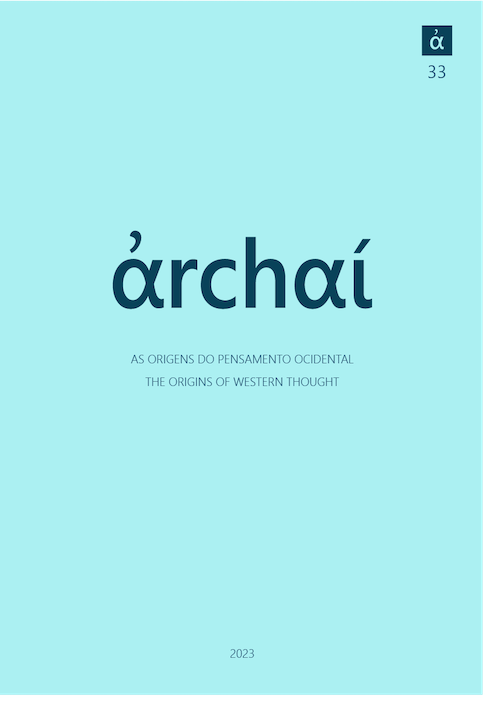Wearing Virtue: Plato’s Republic V, 449a-457b and the Socratic Debate on Women’s Nature
DOI:
https://doi.org/10.14195/1984-249X_33_06Keywords:
Women, Virtue, Kallipolis, AristophanesAbstract
In Plato’s Republic V, 449a-457b, Socrates argues that the guardian class of Kallipolis will comprise both men and women and that women with the appropriate nature ought to receive the same education and fulfill the same tasks as their male counterparts. In this article I argue, against competing interpretations of this claim as dependent either on the necessity of abolishing the oikos or on eugenic principles, that Socrates’ argument ought to be understood as a genuine argument about women’s natural capabilities and ought to be interpreted in light of the Socratic debate about women’s virtues. Moreover, I show that the legal language mobilized, combined with polemical references to Aristophanes, serves the purpose of evoking Socrates’ trial, thus alerting the reader to the seriousness of the proposal in question.
Downloads
References
ANNAS, J. (1976). Plato’s Republic and Feminism. Philosophy 51, p. 307-321.
BELTRAMETTI, A. 2000. L’utopia dalla commedia al dialogo platonico. In: VEGETTI, M. Platone. La Repubblica, Vol. IV, Libro V, Naples, Bibliopolis, p. 233-256.
BRENNAN, T. 2017. The Psychological Import of the first Wave in Republic V. In: HARTE, V., WOOLF. R. (eds.), Rereading Ancient Philosophy: Old Chestnuts and Scared Crows, Cambridge, Cambridge University Press, p. 121-140.
CHIAPPELLI, A. 1883. Le Ecclesiazusae di Aristofane e la Repubblica di Platone. Rivista di Filologia e di Istruzione Classica 11, p. 161-273.
DORION, L.-A. 2009. Xenophon’s Socrates, In: AHBEL-RAPPE, S., KAMTEKAR, R. (eds.), A Companion to Socrates, Oxford, Wiley-Blackwell, p. 93-109.
DUVERGÈS BLAIR, E. 2012. Plato’s Dialectic on Woman. Equal, Therefore Inferior. London and New York, Routledge.
EL MURR, D. 2020. Eristic, Antilogy, and the Equal Disposition of Men and Women (Plato, Resp. 5, 453B-454A), The Classical Quarterly, 70, 1, p. 85-100.
FREDE, D. 2018. Equal but not Equal: Plato and Aristotle on Women as Citizens. In: ANAGNOSTOPOULOS G. and SANTAS, G. (eds.). Democracy, Justice, and Equality. Hamburg, Springer, p. 287-306.
HALLIWELL, S. (ed.) 1998. Plato: Republic V (2nd ed.). Liverpool, Liverpool University Press.
HARRY, C., POLANSKY, R. 2016. Plato on Women’s Natural Ability. Revisiting Republic V and Timaeus 41e3-44d2 and 86b1-92c3, Apeiron, 49, 3, p. 261-280.
GARDNER, C. 2006. The Remnants of the Family: The Role of Women and Eugenics in Republic V. History of Philosophy Quarterly, 17, 3, p. 217-235.
GIANNANTONI, G. 1971. Che cosa ha detto veramente Socrate, Roma, Astrolabio.
GIANNANTONI, G. (ed.) 1990-1991. Socratis et Socraticorum reliquiae, 4 vols. (Collana Elenchos, XVIII). Napoli, Bibliopolis.
LEVIN, S. B. 1996. Women’s Nature and Role in the Ideal Polis. Republic V Revisited. In: WARD, J. (ed.), Feminism and Ancient Philosophy, New York, Routledge, p. 13-30.
MCKEEN, C. 2006. Why Women Must Guard and Rule in Plato’s Kallipolis. Philosophical Quarterly 87, p. 527-548.
MEIJER, P. A. 2017. A New Perspective on Antisthenes. Logos, Predicate and Ethics in his Philosophy, Amsterdam, Amsterdam University Press.
MOLLER OKIN, S. 1979. Women in Western Political Thought. Princeton, Princeton University Press.
PAPPAS, N. 2015. Women at the Gymnasium and Consent for the Republic’s City. Diálogos, 98, p. 27-54.
PLATO 1903. Meno, In: BURNET, I. (ed.), Platonis Opera, t. III, Oxford, Oxford University Press.
PLATO 2003. Platonis Rempublicam, ed. by S. R. SLINGS, Oxford, Oxford University Press
PRINCE, S. H. (ed.) 2015. Antisthenes of Athens: Texts, Translations and Commentary, Ann Arbor, University of Michigan Press.
SAXONHOUSE, A. (1976). The Philosopher and the Female in the Political Thought of Plato. Political Theory 4, 2, p. 195-212.
THESLEFF, H. 1997. The Early Version of Plato’s Republic. Arctos. Acta Philologica Fennica 31, p. 149-174.
TOWNSEND, M. 2017. The Woman Question in Plato’s Republic, New York and London, Lexington Books.
VLASTOS, G. 1991. Socrates. Ironist and Moral Philosopher, Ithaca (NY), Cornell University Press.
XENOPHON 1900-1920. Xenophontis Opera Omnia, ed. by E. C. MARCHANT, Oxford, Clarendon Press, vol. 1-5.
Downloads
Published
How to Cite
Issue
Section
License
Copyright (c) 2023 Cinzia Arruzza

This work is licensed under a Creative Commons Attribution 4.0 International License.
Given the public access policy of the journal, the use of the published texts is free, with the obligation of recognizing the original authorship and the first publication in this journal. The authors of the published contributions are entirely and exclusively responsible for their contents.
1. The authors authorize the publication of the article in this journal.
2. The authors guarantee that the contribution is original, and take full responsibility for its content in case of impugnation by third parties.
3. The authors guarantee that the contribution is not under evaluation in another journal.
4. The authors keep the copyright and convey to the journal the right of first publication, the work being licensed under a Creative Commons Attribution License-BY.
5. The authors are allowed and stimulated to publicize and distribute their work on-line after the publication in the journal.
6. The authors of the approved works authorize the journal to distribute their content, after publication, for reproduction in content indexes, virtual libraries and similars.
7. The editors reserve the right to make adjustments to the text and to adequate the article to the editorial rules of the journal.



